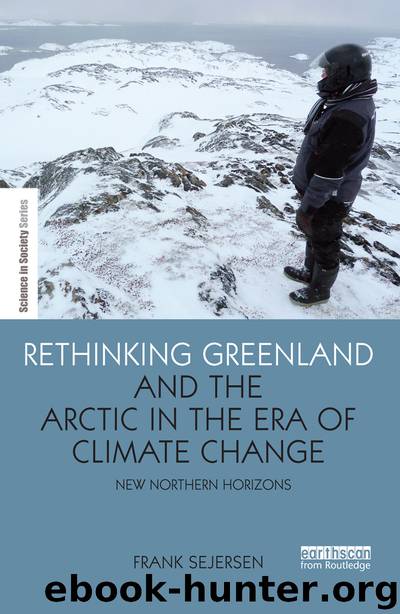Rethinking Greenland and the Arctic in the Era of Climate Change by Frank Sejersen

Author:Frank Sejersen [Frank Sejersen]
Language: eng
Format: epub
ISBN: 9781317542513
Publisher: Taylor & Francis Ltd
Even though Feenberg finds a footing in such a deterministic stand, based on substantive theory, he does not write off human agency, choice or the will to transform the goal-horizon through technological means. He maintains that technology can be bent to serve cultural values and political ambitions. Therefore, he argues that ‘[f]rom an economic standpoint, the dependence of technology on culture means that alternative rationalizations are possible, each equally “efficient” in terms of achieving its own ends, but employing different configurations of means to do so’ (Feenberg, 1991, p. 115, italics in original). The technological order is thus, for Feenberg, a potential starting point for divergent developments depending upon the cultural environments that shape it. What Feenberg does is to deny that one single technical phenomenon (such as a factory) can be demarcated, characterized and rejected as a whole. This is a non-deterministic approach, where technological development is influenced by both technical and social criteria of progress which, according to him, opens up for changes in society in a variety of directions depending on the prevailing hegemony (Feenberg, 1991, p. 130). At the same time, he finds the adaptive relationship between technology and society to be one of reciprocity, which entails that ‘technology changes in response to the conditions in which it finds itself as much as it influences them’ (Feenberg, 1991, p. 130). The foundation for this relationship is that technical objects are considered social objects, which is also reflected in the use of the term, ‘socio-technical systems’. The technological changes and their relationship with society are thus to be considered particular cases of industrialism that need to be considered in relation to the particular society in question. ‘The content and meaning of industrialism is not exhausted by our experience of it since technology still contains potentialities that might yet be actualized in a different cultural context’ (Feenberg, 1991, p. 131).
If this analytical focus on social potentialities is to be applied in Greenland, it is going to be necessary to look at how society discusses and evaluates the smelter project, i.e. the technology in question, and at how its potentialities are constructed and understood on a broader scale rather than as being compartmentalized within the environmental and economic fields. One could thus ask the following question: What kind of society is envisioned and mobilized by this particular future socio-technical system?
Download
This site does not store any files on its server. We only index and link to content provided by other sites. Please contact the content providers to delete copyright contents if any and email us, we'll remove relevant links or contents immediately.
| Anthropology | Archaeology |
| Philosophy | Politics & Government |
| Social Sciences | Sociology |
| Women's Studies |
Cecilia; Or, Memoirs of an Heiress — Volume 1 by Fanny Burney(32548)
Cecilia; Or, Memoirs of an Heiress — Volume 2 by Fanny Burney(31947)
Cecilia; Or, Memoirs of an Heiress — Volume 3 by Fanny Burney(31932)
The Great Music City by Andrea Baker(31917)
We're Going to Need More Wine by Gabrielle Union(19034)
All the Missing Girls by Megan Miranda(15958)
Pimp by Iceberg Slim(14488)
Bombshells: Glamour Girls of a Lifetime by Sullivan Steve(14057)
For the Love of Europe by Rick Steves(13915)
Norse Mythology by Gaiman Neil(13349)
Talking to Strangers by Malcolm Gladwell(13349)
Fifty Shades Freed by E L James(13233)
Mindhunter: Inside the FBI's Elite Serial Crime Unit by John E. Douglas & Mark Olshaker(9324)
Crazy Rich Asians by Kevin Kwan(9279)
The Lost Art of Listening by Michael P. Nichols(7494)
Enlightenment Now: The Case for Reason, Science, Humanism, and Progress by Steven Pinker(7306)
The Four Agreements by Don Miguel Ruiz(6745)
Bad Blood by John Carreyrou(6611)
Weapons of Math Destruction by Cathy O'Neil(6265)
